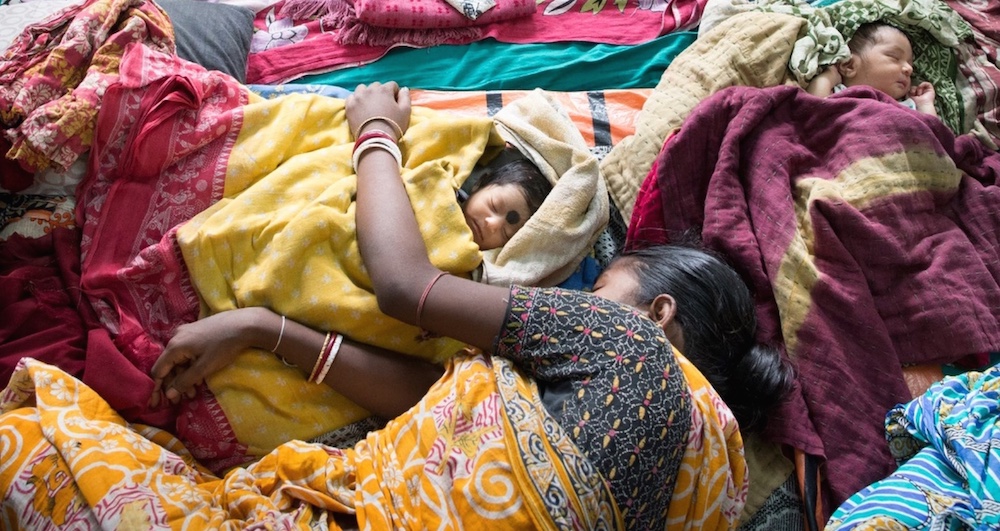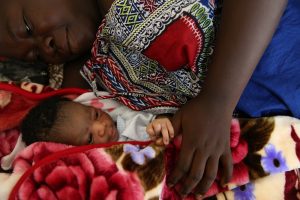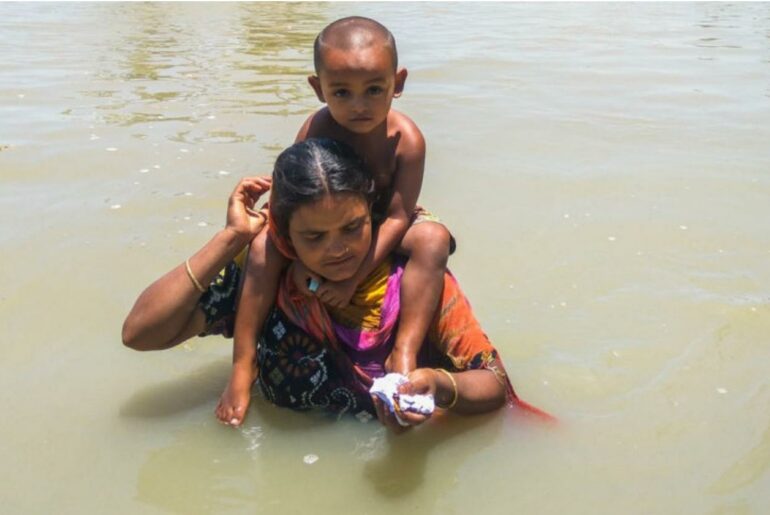Maternal Health: an indicator of Global Health
“Women are not dying because of untreatable diseases.
They are dying because societies have yet to make the decision that their lives are worth saving“
Professor Mahmoud Fathalla, President of the International Federation of Obstetricians and Gynaecologists
Maternal Mortality and Morbidity
Some 300 000 mothers still die each year from complications linked to pregnancy or childbirth
- a dire and unacceptable figure, which translate into one mother dying every two minutes (Source: World Health Organisation – WHO).

Birth day in India – Photo Lieve Blanckaert
WHO defines maternal mortality as “the death of a woman during pregnancy or in the 42 days following the end of her pregnancy – of any cause linked to the pregnancy or aggravated by it or the treatment of it, but not accidental or secondary causes”. Principal causes are hemorrhage, infection, non-medical abortion, arterial hypertension or prolonged or difficult labour.
Between 1990 and 2013, the global maternal mortality ratio decreased from 380 to 210 per 100,000 pregnancies, i.e. a significant reduction of 45%. However, while these figures are encouraging, they are still way too high and far from the 75% decrease between 1990 and 2015 which the UN Member States committed to in 2000 with the Millenium Development Goals, and well below target 3.1 to which committed to in 2015 with the SDGs – ‘By 2030, reduce the global maternal mortality ratio to less than 70 per 100 000 live births‘.
Less visible but also dramatic: maternal morbidity
In addition, for each maternal death, there are about 30 cases of illness or handicap linked to pregnancy or childbirth. A too frequent example of maternal morbidity is the obstetric fistula, a debilitating condition which can be avoided, and whose consequences are tragic for the mothers. In addition to suffering physically, they are shamed, abandoned and ostracised by their communities. Another example is sterility which can result from complications, and whose social consequences can be as serious.
The absence of any clear definition, as well as the lack of statistics on this often taboo subject, contributes to its lack of visibility. Maternal mortality (easier to count despite inadequate civil registers) is only the tip of the iceberg.
A public health issue, but also a women’s human rights issue
The majority of these deaths and disabilities linked to motherhood could be avoided by medical follow-up during pregnancy and skilled attendance during birth. Maternal mortality is a significant indicator of the quality of the health system of any country – and of the status of women in the society.
Maternal mortality and morbidity are in fact also the result of gender inequality and discriminations suffered by women, especially with regard to access to their fundamental rights (right to life, right to the highest standard of health …). Gender equality also contributes significantly to better maternal health.
Also in developed countries…
If 99% of these shocking figures concern developing countries (particularly sub-Saharan Africa), cases of maternal mortality also exist in developed countries.
Among them, the United States of America is the only developed country where the maternal mortality rate is rising – +27% between 2000 and 2014, to reach 28 per 100,000 births – an increase which is directly related to both racial discrimination and the illnesses which affect the American population: obesity, diabetes, cardiovascular diseases…
Risk factors linked to age and economic and social situation

Photo Dominic Chavez/World Bank – Sierra Leone 2016
The risk of complications and of death from pregnancy or childbirth is higher among adolescent girls than among older women. Pregnancy is one of the leading causes of death among girls aged 16-19.
Similarly, maternal mortality is also higher amongst women living in rural areas and in disadvantaged communities. This is particularly true in the United States where black women are up to three times more likely to die in pregnancy than other women.
Maternal mortality on the international agenda
The scale of this issue has been recognised at the international level: reducing maternal mortality is on the 2030 Agenda for sustainable development – in SDG 3 devoted to health: Target 3.1: By 2030, reduce the global maternal mortality ratio to less than 70 per 100,000 live births.
Nevertheless, this objective was already part of the Millenium Development Goals adopted by states in 2000, and by 2015 it was realised that too few countries had reached the target of a 75% decrease. A situation which MMM has repeatedly denounced.
“Governments and all stakeholders cannot promote “social equality, human rights and social justice for all” if they are not serious about efforts to eradicating preventable maternal mortality for all women. They cannot turn a blind eye if the worst life decision a woman can make is to have a child. Women in poor countries cannot be punished and lose their lives for performing the very task that everyone agrees is essential to human development.”
MMM Statement to the 58th Session of the UN Commission on the Status of Women
Obstetric violence and disrespectful maternal care: a problem which is gaining visibility
Throughout the world, the veil is beginning to be lifted on the subject of ill-treatment and violence suffered by numerous women in health facilities during pregnancy and childbirth.
This violence, generally described as obstetric violence, can vary from verbal insults to a refusal of information, authoritarian behaviour, such as forced immobilisation, unwanted episiotomy, or a refused epidural – i.e. any act that forces the pregnant woman to undergo something against her will or which strips her of her dignity.
These acts of mistreatment not only negatively affect the well-being of mothers, but they can put their lives in danger. They are clearly a violation of the women’s fundamental rights “to benefit from the highest possible standard of health”, which include the right to receive care with respect and dignity, as well as the right to non-discrimination and the absence of violence.
Fundamental rights for all women must be respected – including when they are pregnant and in childbirth. Each woman must be considered as a person capable of being informed, an of taking medical decisions for herself and her child. Health systems must be able both to satisfy the individual needs of each patient and to respect their choices concerning birth.
In developed countries, and specifically in Europe, the problem of obstetric violence arises in the context of over-medicalising birth, an issue which is also the subject of discussions regarding the choices which are left to mothers.
Surrogacy
 MMM is a supporter of the #StopSurogacyNow movement, which opposes to the exploitation of women and the human trafficking of children through surrogacy.
MMM is a supporter of the #StopSurogacyNow movement, which opposes to the exploitation of women and the human trafficking of children through surrogacy.
We also have developed our own position paper explaining why we oppose the practice of surrogacy.
MMM member associations in action in the field
- Memisa (based in Belgium) undertakes projects in Benin, Burundi, Congo-Brazzaville, India, Mauritania and the Democratic Republic of Congo (DRC) to improve access to maternal health care and save lives
- Mothers & Midwives Support (MMS) supports and trains midwives in the Kivu region of the DRC, to reduce maternal and infant mortality
- Irish Maternity Support Network and Mame pentru Mame (Romania) advocate for respect for mothers and their choices regarding maternal health and childbirth
- Viallaite promotes breastfeeding in Cameroon





